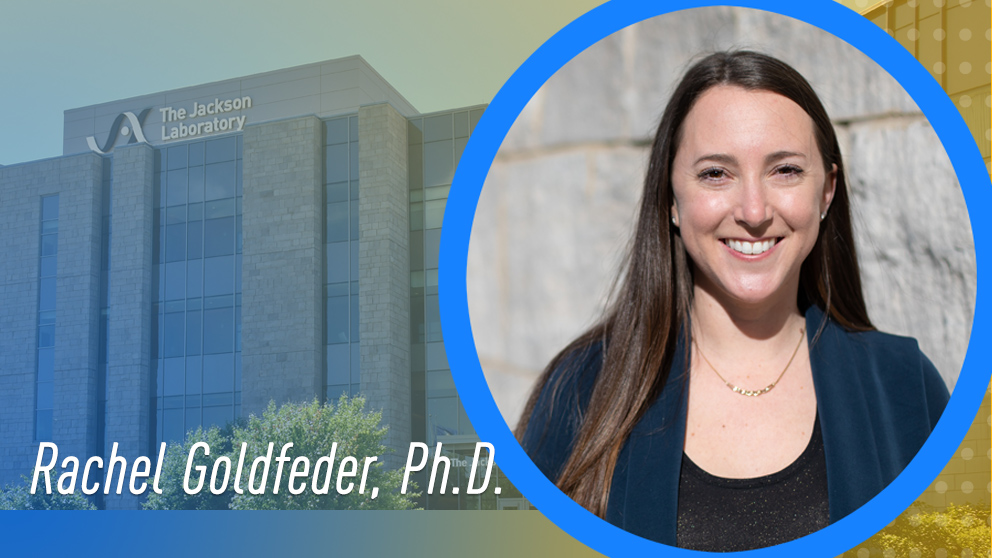
An interview with JAX computational scientist Rachel Goldfeder
When did you become interested in science?
When I was young I liked things like Tinker Toys, putting things together and taking them apart. And I enjoyed learning about rocks and plants, and getting to know the world around me. Even in school I was always drawn towards science and math. I remember loving math card competitions, and constantly asking my mom to “give me a math problem” when we were in the car. I really assumed everybody was interested in those things! It probably wasn’t until high school, when I was enrolling in advanced placement science classes like AP Bio and AP Chemistry, that I realized, “Oh, there are only five of us in this class!”
How did you choose what undergraduate and graduate degrees to pursue?
I always knew I wanted to work in the biological sciences, to apply science to improve human health. I didn’t want to be a physician; instead, I thought, "Wow, what if I could contribute to this from the research and development side?” I wanted to be an inventor: I loved the idea of starting with a concept, building something brand new and applying it to health and medicine. So I earned a B.S. in biomedical engineering from Washington University in St. Louis and my Ph.D. in biomedical informatics at Stanford University.
When I was in graduate school my parents had come to visit me, and they wanted a tour of my workspace, which I always referred to as “the lab.” So, my parents were surprised that my workspace was just a desk, computer and chair. My mom asked, “But where's your lab coat? You're a scientist!” And I had to explain that my science experiments are all done on the computer.
What is your current role at JAX?
I'm currently a computational scientist, studying the human genome. I'm really interested in how people have a predisposition for certain diseases based on their genetic sequence. The human genome is 6 billion letters long, so to study it effectively, I use software. In particular, I like to study it by creating brand new algorithms that haven't existed before. As our genome technologies evolve, we need to develop really advanced software that can go with those new technologies, and that’s basically what I do.
My primary project now is focused on developing a diagnostic tool that is noninvasive, or that requires just a simple blood draw, to detect whether a patient has cancer. Our idea is that understanding the different genetic and epigenetic patterns in people with and without cancer will allow us to detect a patient’s cancer earlier, thereby improving their prognosis. We have a team of scientists who have developed the “wet lab” experimental protocols for this, and my role is in creating the software that analyses the data to provide the answers.
How did the COVID-19 pandemic affect your work?
When the pandemic was just starting, Rich Lussier and Chia-Lin Wei reached out to me and said that JAX was developing COVID-19 testing. There were already multiple JAX teams working on this, and what they really needed was somebody who could come and help organize it all, coordinate the logistics, kind of sit at the intersection of all these teams to help pull them together to build out this project. This felt like the most important thing we could be doing at this time, and I was thrilled to be involved.
I really love logistics and organizing things. For example, I organize a long-read sequencing workshop, so obviously I love the technical science components of that, but I also get a lot of joy from the coordinating and bringing it all together and making sure everyone gets the maximum benefit from the program. I also started the WiSE [Women in Science and Engineering] group at JAX.
What would you be doing if you weren’t a scientist?
That’s hard to imagine, because even in my home life, everything is kind of an experiment. Like cooking—In a way, that's kind of an experiment. Like, "Ooh, can I add a little bit more of this, and see what happens?" Lately I've gotten into Italian cooking. I don't want to say, "Oh, I would definitely be a chef," but that would be something I could be interested in. It’s kind of a combination of chemistry and logistics!
What else do you enjoy outside work?
I absolutely love hiking. I did my Ph.D. out in the San Francisco Bay area, and gosh, all the hiking trails out there. That was where I really started getting into it. Even here in Connecticut, there are great trails my husband and I can do straight from our house, or we drive up to Vermont or New Hampshire for longer trails and bigger mountains. And when there isn’t a pandemic, we love to travel.
What first brought you to The Jackson Laboratory?
I was immediately drawn to the work I would be doing here at JAX. I was very excited to get to contribute to important biomedical research — I’m really interested in clinical applications of genomic studies. I was also (and still am!) very excited to work with my boss, Chia-Lin Wei – she is a true rockstar, and I knew that I would learn so much from getting to work with her.
When I was applying, I was considering some big companies and some really small start-ups, and JAX felt like such a beautiful hybrid of the two. You have this 90-year-old institution with a strong, longstanding, reputation in science, but JAX Genomic Medicine is still pretty new, and I felt it offered the opportunity to contribute to its future and to help shape the culture.
What advice would you give to a girl in high school who’s considering a major and career in science?
I would say, definitely do what you love. Keep pushing forward and challenging yourself and don’t give up.